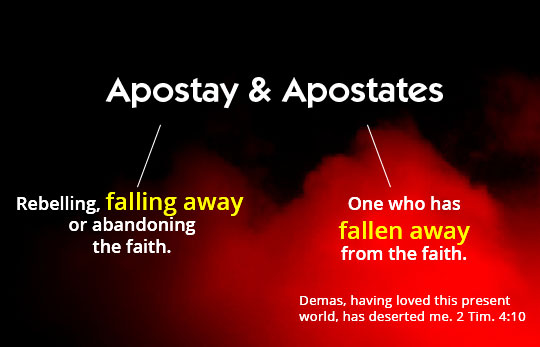Bible Question:
What is apostasy? What is an apostate?
Bible Answer:
The purpose of this article is to provide definitions of both apostate and apostasy in the Bible. An additional question that will be answered is, “Were these people ever saved?” That is, were apostates saved? The most important verse in the Bible regarding apostasy is 2 Thessalonians 2:3. Let us discover the definition of apostasy.

What Is Apostasy?
The words apostasies and apostasy occur six times in the Bible (Jeremiah 2:19; 5:6; 8:5; 14:7; Hosea 14:4; 2 Thessalonians 2:3). In the Old Testament, the Hebrew word for apostasy is musba, and in the New Testament the Greek word for apostasy is apostasia. The basic meaning of both words is “defection,” “rebellion” or “a falling away.”
For our purpose, we will examine only the word apostasia. The Liddel and Scott Greek lexicon states that the apostasy definition is “defection, revolt” or “departure.”[1] Danker and Bauer write that apostasy is “rebellion, abandonment, breach of faith.[2]” In classical Greek, apostasia was sometimes used to refer to political or military rebellion.[3] In summary, the basic definition of apostasy has the sense of abandonment and rebellion.
Therefore, apostasy is spiritual rebellion against the faith, which was once for all delivered to the saints (Jude 3). The definition of apostasy is falling away from the faith. In 2 Thessalonians 2:3, the word refers to a spiritual rebellion against God.
Let no one in any way deceive you, for it will not come unless the apostasy comes first, and the man of lawlessness is revealed, the son of destruction . . . 2 Thessalonians 2:3 (NASB)
That is, apostasy is the falling away from God, abandoning God or rebelling against God.
What Is an Apostate?
An apostate is an individual who commits apostasy. An apostate falls away from the faith. The highly regarded Kittel lexicon gives the apostate definition of “rebel.”[4] That is, apostates rebel against the faith that at one time they claimed they believed. An apostate is someone who was never a believer even though they attended church, sang worship songs, read the Bible and acted like a Christian. The sad truth is they were never real. They were a tare among the wheat. Tares look like the real thing. They look like wheat, but they are not. They were never a believer. That is the message of Jesus’ Parable of the Tares and Wheat.
There are apostate churches—churches that are no longer true to the faith. In Revelation 3:14-22, the church of Laodicea was filled with apostates. In verse 20 we are told that Jesus was knocking on the door. He was not in the church. There were no Christians in the church. Today there are many churches and denominations that have committed apostasy. They no longer hold to the faith. The faith has been distorted to please the sensibilities of people. As one politician stated some years ago, churches need to change what they teach to agree with the modern age. Many churches have done exactly that. Salvation is no longer by grace through faith in Christ alone (Acts 4:12; Ephesians 4:8-9).
There are individuals who have said a prayer and thought they were saved and going to heaven. The apostle warns in 1 Corinthians 15:2 that is possible to have vain faith. That is, someone can have empty faith that does not save. 1 John 2:19 describes apostates.
They went out from us, but they were not really of us; for if they had been of us, they would have remained with us; but they went out, so that it would be shown that they all are not of us. 1 John 2:19 (NASB)
This verses teaches us that some individuals will leave the faith some time or even years after professing to be Christians. But 1 John 2:19 teaches that they were never real. Judas Isacariot is an example. Jesus called him the son of prediction (John 17:12). 1 Peter 1:4-9 describes a true believer as one who will never leave the faith. Other passages are John 10:28-29; Romans 8:30-39; Philippians 1:6 and Jude 1.
True believers will never become apostates, and those who apostatize were never believers.
The Apostasy – 2 Thessalonians 2:3
2 Thessalonians 2:3 teaches us that the “man of lawlessness,” that is the Antichrist, will not become obvious until the apostasy occurs. In the Greek text, a definite article, the, precedes the Greek word apostasia. This means the apostasy mentioned in 2 Thessalonians 2:3 is “The apostasy.” Jesus describes the apostasy before the tribulation in Matthew 24:7-14 and Luke 21:10-11. That is, there is coming a unique time in the future when there will be an extremely unusual apostasy worldwide.
References:
1. Liddell and Scott. Greek-English Lexcon. Oxford Press. 1996. p. 218.
2. Danker and Bauer. Greek-Lexicon of the New Testament and Other Early Christian Literature. University Chicago Press. 1979. p. 120.
3. D. Edmond Hiebert. First Timothy. Moody Press, Chicago, IL, 1957, p. 305.
4. Kittel. Theological Dictionary of the new Testament. Eerdmans. 1968. vol. 1, p. 513.
Suggested Links:
Parables of the Kingdom — Tares and WheatAre Only A Few Being Saved?